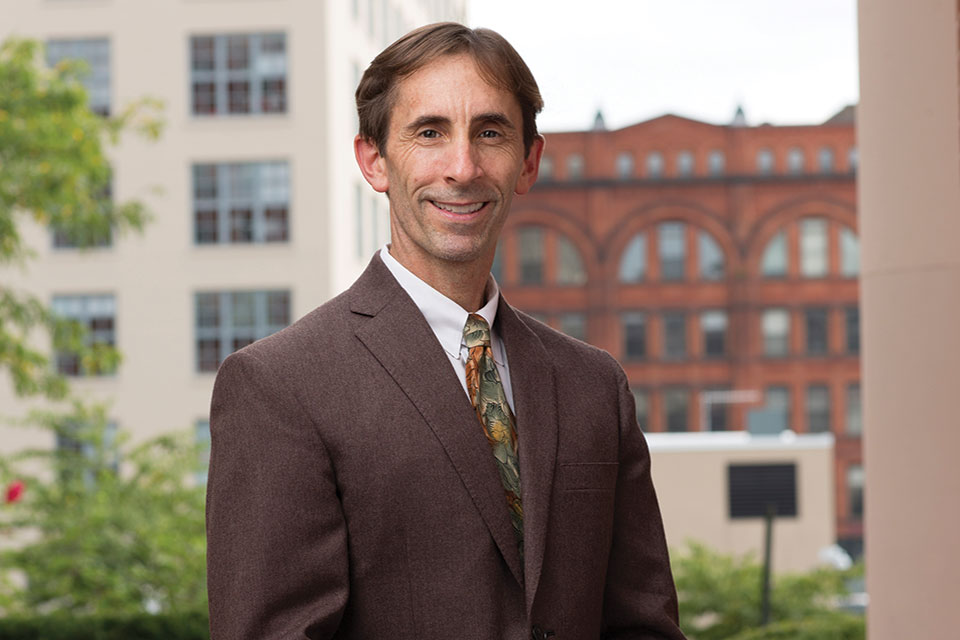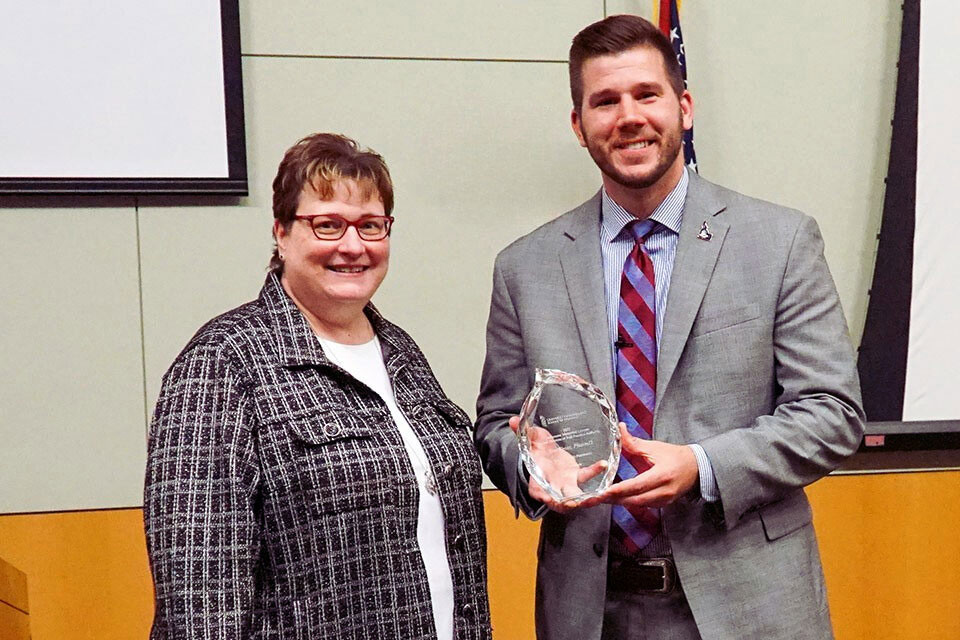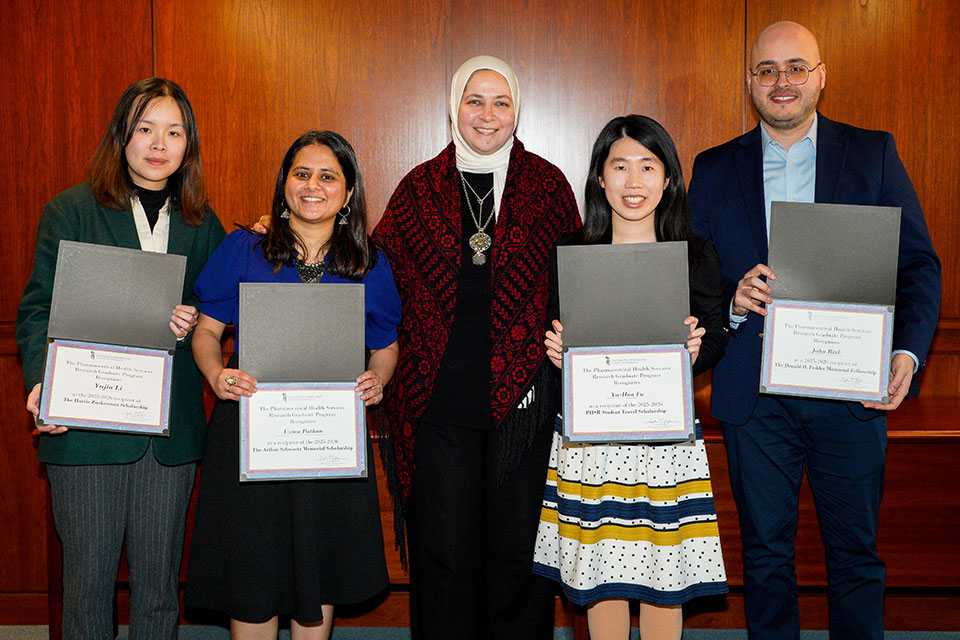Use of AI in Pharmacy Focus of Annual Balassone Memorial Lecture
The annual Balassone Memorial Lecture, held on Nov. 20, featured a panel of experts in discussion on the emerging role of generative AI in pharmacy and population health.
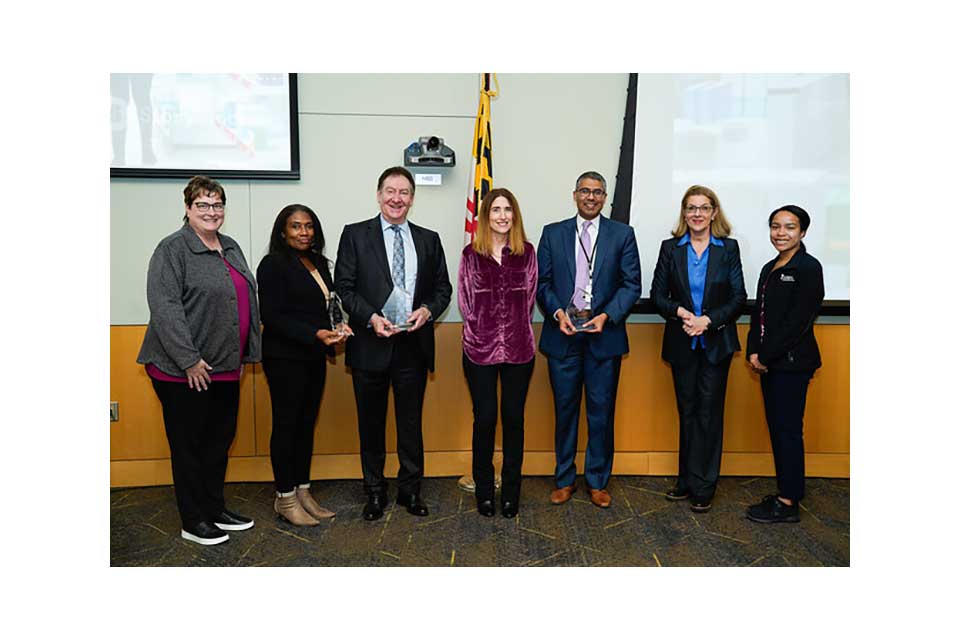
By Pam Carder
December 19, 2024
The University of Maryland School of Pharmacy hosted its annual Francis S. Balassone Memorial Lecture on Nov. 20, featuring experts in health care, pharmacy, innovation, and artificial intelligence for a discussion on the promise of generative AI (GenAI) in pharmacy and population health.
This year’s lecture was presented in a panel format and was organized and moderated by Fadia Shaya, PhD, MPH, a professor of practice, sciences, and health outcomes research and a University of Maryland, Baltimore (UMB) Distinguished University Professor. It featured Stephen Davis, MBBS, FRCP, FACE, MACP, Theodore E. Woodward Professor of Medicine and chair of the Department of Medicine at the University of Maryland School of Medicine and director of UMB’s Institute for Clinical and Translational Research; Warren D’Souza, PhD, MBA, FAAPM, chief innovation officer at the University of Maryland Medical System; and Deena Speights-Napata, MA, executive director of the Maryland Board of Pharmacy.
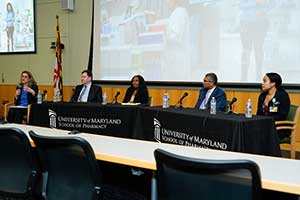 The panelists discussed current applications and future potential of GenAI, offering a comprehensive and balanced view of its transformative power in health care and clinical and translational science. “The topic of AI in population health and clinical translational science and research is a fundamental example of the overlap between informatics, data science, dissemination, and implementation,” said Shaya.
The panelists discussed current applications and future potential of GenAI, offering a comprehensive and balanced view of its transformative power in health care and clinical and translational science. “The topic of AI in population health and clinical translational science and research is a fundamental example of the overlap between informatics, data science, dissemination, and implementation,” said Shaya.
The experts reflected on and discussed the rapid development of GenAI and how it is poised to revolutionize health care, enhance patient care, improve pharmacy and medical workflows, and support broader population health management.
Panelists also commented on how the application of GenAI spans the spectrum of drug discovery to precision medicine to population health. An example offered was the potential for pharmacists to take a more central role in improving outcomes, using GenAI tools to assist in drug therapy management, decision support, and preventative care.
“AI can analyze health data trends to predict outbreaks, chronic disease prevalence, or emerging health crises, such as predicting opioid use disorder trends, and can suggest targeted interventions for high-risk populations. This emerging technology will be a game changer for proactive care management,” said Shaya.
The panel covered some of the challenges and ethical considerations concerning data privacy and security and emphasized the critical importance of maintaining patient confidentiality and securing compliance with regulations like HIPAA.
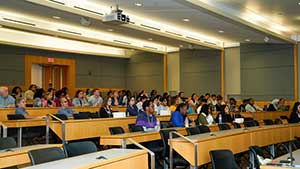
A significant portion of the discussion involved potential bias in AI models, which can be based on the data it is trained on. “If a dataset underrepresented certain populations, the AI could make less accurate predictions for those groups, and possibly result in missed diagnoses, under-treatment, and amplified health disparities,” explained Shaya. “Ethical AI development is essential to avoid exacerbating health disparities.”
The panel concluded on the note that GenAI holds tremendous promise for enhancing patient care and translational science, supporting clinical decision-making, and improving patient outcomes. The experts agreed that in population health, AI could enable more targeted interventions, improve equity, and help manage public health crises.
The Francis S. Balassone Memorial Lecture was established in 1976 by the Maryland Pharmacists Association and the School of Pharmacy’s Alumni Association in memory of Francis Balassone, an alumnus of the Class of 1940, and a faculty member at the School. Balassone was executive secretary of the Maryland Board of Pharmacy and was instrumental in establishing the first School-based pharmacy student externship program in the nation. This annual lecture brings leaders and experts to the School to engage faculty, staff, and students in conversations about the future of the pharmacy profession and of health care. It is one of three endowed lectures at the School.
“At the School of Pharmacy, our endowed lectures provide academic enrichment by bringing thought leaders to engage with our faculty, staff, and students,” said Sarah L.J. Michel, PhD, dean of the School of Pharmacy and professor of pharmaceutical sciences in her opening remarks. “They foster intellectual growth and inspire innovation and research, sparking new ideas and collaborations.”

